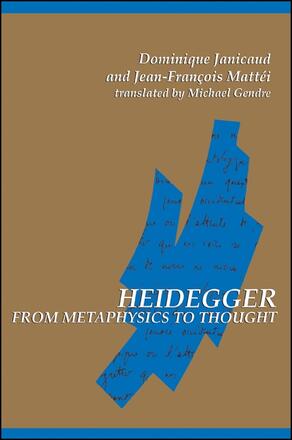
Heidegger from Metaphysics to Thought
Alternative formats available from:
Janicaud clarifies the project of “overcoming” metaphysics, a project that Heidegger himself recognized as open to innumerable misunderstandings, and Mattei inquires into the major Heideggerian texts produced between 1935 and 1969 to detect the cosmic figure of the Geviert, the initial Fourfold where “earth and sky, the divine ones and the mortals” gather.
Description
"Philosophy has come to an end" claimed Heidegger in the final posthumously published interview he granted to Der Spiegel. The goal of Janicaud's chapters ("Overcoming Metaphysics?," "Heideggeriana," "Metamorphosis of the Undecidable," and the dialogue "Heidegger in New York") first of all is to clarify the project of "overcoming" metaphysics, a project that Heidegger himself recognized as open to innumerable misunderstandings. Is it really possible to surmount metaphysics, not by transgressing it, but by means of a patient elucidation of its key concepts? In the effort to underscore the originality of his own enterprise, doesn't Heidegger tend to project too harsh a dichotomy between the forgetfulness of Being and its authentic recollection? By raising these questions, Janicaud suggests that Heidegger himself does not elude the objections that he directs toward the great metaphysical thinkers.
The final recourse to dialogue in the midst of twentieth-century New York--a landscape intentionally "different" from one expectedly Heideggerian--intends to hint at another possibility than the indefinite deconstruction of metaphysical texts. It suggests new ways for thoughtful meditation and a new cast for action.
At the center of the book, Mattei evokes the "Heideggerian Chiasmus or the Setting-apart of Philosophy." Through an inquiry into the major Heideggerian texts produced between 1935 and 1969 and inspired by Holderlin's poetry, Mattei gradually detects the cosmic figure of the Geviert, the initial Fourfold where "earth and sky, the divine ones and the mortals" gather. Such a community, whose meaning Heidegger is the only one to decipher in our times, silently conforms to an archaic philosophy. The cosmic game of the Geviert also evokes, for Heidegger, the path of the Tao in the Chinese tradition. In this epoch characterized by the destruction of ontology, the two paths in which East and West meet may grant us moderns the hope one day of "dwelling" in the world.
Dominique Janicaud is Professor of Philosophy and directs the Doctoral Studies Program at the Universite de Nice. He is also the Director for the Centre de Recherche d'Histoire des Idees. Jean-Francois Mattei is Professor of Philosophy at the Universite de Nice and the Institut d'Etudes Politiques. He was the General Editor and Director of Volume III of the Encyclopedie Philosophique Universelle (1992) and is currently the Advisor with Ambassadorial Representation to the Minister of Education of France. Professors Janicaud and Mattei each have published a number of other books.